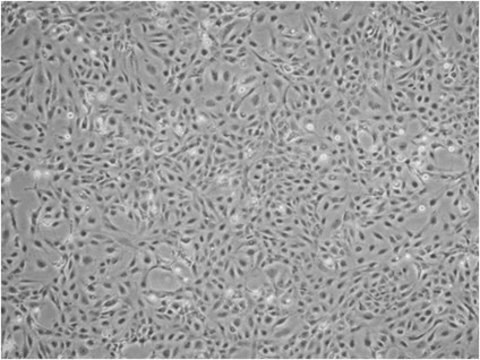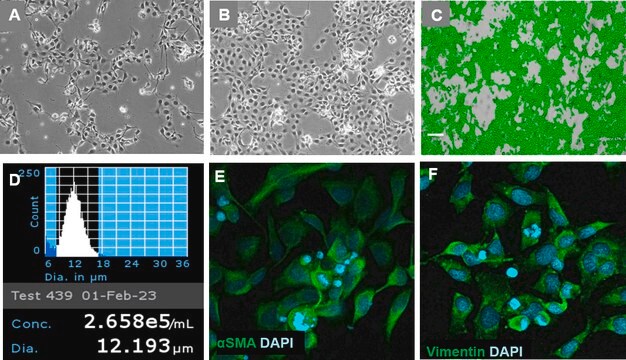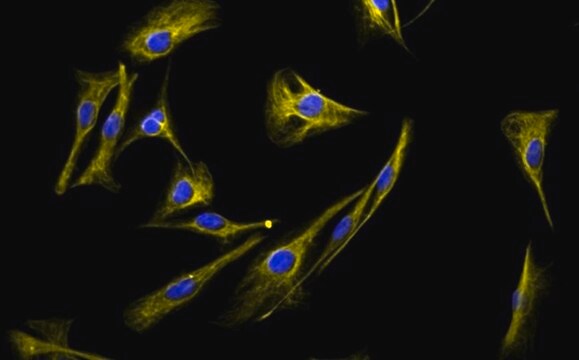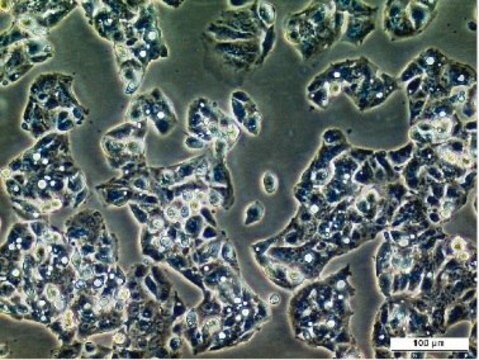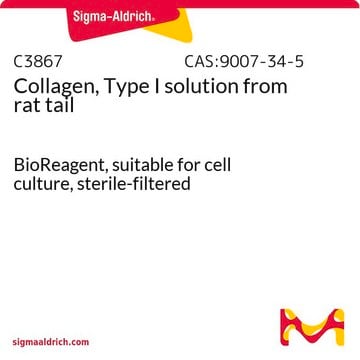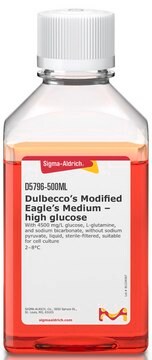SCM064SFM
LX-2 Human Hepatic Stellate Serum-Free Media

Synonym(s):
HSC, Hepatic lipocytes, Hepatic pericytes, Ito cells, Perisinusoidal cells
Sign Into View Organizational & Contract Pricing
All Photos(1)
About This Item
UNSPSC Code:
41106514
Recommended Products
biological source
human
Quality Level
packaging
vial of 250 mL
manufacturer/tradename
Millipore
technique(s)
cell culture | mammalian: suitable
shipped in
dry ice
storage temp.
−20°C
Application
Appearance (Color): Clear, Red Liquid
pH: 7.2 – 7.8
Osmolality: 289-310 mOsm
Sterility Tested: No Growth/Pass
Endotoxin: 2 EU/mL
Mycoplasma: Negative
Functional Assay: Thaw and culture of LX-2 cells.
pH: 7.2 – 7.8
Osmolality: 289-310 mOsm
Sterility Tested: No Growth/Pass
Endotoxin: 2 EU/mL
Mycoplasma: Negative
Functional Assay: Thaw and culture of LX-2 cells.
Features and Benefits
Serum-Free media optimized to expand and culture LX-2 human hepatic stellate cells.
Target description
LX-2 Human Hepatic Stellate Serum-Free Media (SCM064SFM) is a ready to use, serum-free culture medium specifically designed for the growth and proliferation of LX-2 human hepatic stellate cells (SCC064, SCC064SF).
Hepatic stellate cells are a major cell type responsible for liver fibrosis following their activation into fibrogenic myofibroblast-like cells in diseases such as chronic alcoholism, hepatitis B and C, fatty liver disease, obesity, and diabetes. LX-2 cells, an immortalized human hepatic stellate cells, retain key features of primary hepatic stellate cells (HSCs) and have been extensively utilized in the study of liver fibrosis.
SCM064SFM eliminates the reliance on FBS, providing a consistent and controlled environment for cell culture. This ensures reproducibility in experimental results and reduces variability often associated with serum-based media. The media is optimized to support the growth and proliferation of LX-2 cells, enabling researchers to conduct experiments with similar cell yields and viability compared with cells grown on FBS supplemented media. By eliminating the need for FBS, SCM064SFM significantly reduces the demand for animal-derived products, contributing to ethical research practices and animal welfare.
Hepatic stellate cells are a major cell type responsible for liver fibrosis following their activation into fibrogenic myofibroblast-like cells in diseases such as chronic alcoholism, hepatitis B and C, fatty liver disease, obesity, and diabetes. LX-2 cells, an immortalized human hepatic stellate cells, retain key features of primary hepatic stellate cells (HSCs) and have been extensively utilized in the study of liver fibrosis.
SCM064SFM eliminates the reliance on FBS, providing a consistent and controlled environment for cell culture. This ensures reproducibility in experimental results and reduces variability often associated with serum-based media. The media is optimized to support the growth and proliferation of LX-2 cells, enabling researchers to conduct experiments with similar cell yields and viability compared with cells grown on FBS supplemented media. By eliminating the need for FBS, SCM064SFM significantly reduces the demand for animal-derived products, contributing to ethical research practices and animal welfare.
Storage and Stability
Upon receipt store at -20˚C. When ready to use, thaw overnight at 2-8˚C. Once thawed, mix thoroughly. Use immediately and store at 2-8˚C for up to 3-4 weeks. Multiple freeze/thaw cycles are not recommended.
Disclaimer
Unless otherwise stated in our catalog or other company documentation accompanying the product(s), our products are intended for research use only and are not to be used for any other purpose, which includes but is not limited to, unauthorized commercial uses, in vitro diagnostic uses, ex vivo or in vivo therapeutic uses or any type of consumption or application to humans or animals.
Storage Class Code
12 - Non Combustible Liquids
WGK
WGK 1
Flash Point(F)
Not applicable
Flash Point(C)
Not applicable
Certificates of Analysis (COA)
Search for Certificates of Analysis (COA) by entering the products Lot/Batch Number. Lot and Batch Numbers can be found on a product’s label following the words ‘Lot’ or ‘Batch’.
Already Own This Product?
Find documentation for the products that you have recently purchased in the Document Library.
Our team of scientists has experience in all areas of research including Life Science, Material Science, Chemical Synthesis, Chromatography, Analytical and many others.
Contact Technical Service